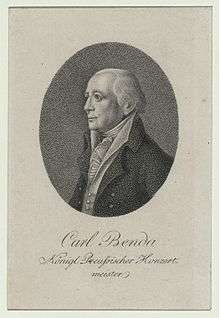Karl Hermann Heinrich Benda

Karl Hermann Heinrich Benda (also Carl Benda), (baptised 2 May 1748 – 15 March 1836) was a German violinist and composer of Bohemian origin.
Life
Karl Benda was the younger of two sons[1] of the violinist and composer Franz Benda. His godparents were the margraves Friedrich Heinrich (Brandenburg-Schwedt) and Karl Friedrich Albrecht von Brandenburg-Schwedt as well as the Russian envoy Hermann Carl von Keyserlingk. Like his sisters Wilhelmine, Maria Carolina, Friedrich, Sophie Anna Henriette[2] and Juliane he received music lessons from his father Franz Benda. In 1766, Karl was accepted in the Hofkapelle.[3]
As a violin virtuoso, especially in his performance of adagios, Karl Benda closely resembled his father.[4] They were also said to be similar in character, stature and physiognomy.[5] He was also a prized piano teacher; among his students were King Friedrich Wilhelm III. as well as his brother Ludwig, who gave him a lifelong patronage. Other students of Karl Benda were Carl Friedrich Rungenhagen, the actor and singer Friedrich Ludwig Seidel and the singer Luise Rudorff, whom he saw performing in the Weimarer Hoftheater in 1792,[6] when he was visiting his sisters Wilhelmine and Maria Carolina.[7] Karl Benda was also accompanist at the Royal Opera in Berlin. In 1802, he became successor to his deceased uncle Joseph Benda, who was a concert master at the Hofkapelle in Berlin.
Descendants
In 1777, Karl Benda married a daughter of the war minister Friedrich August Barth, with whom he had a son August Wilhelm Heinrich Ferdinand (1779–1861). On 28 April 1825, while employed as Kammerdirektor for the princes of Thurn und Taxis, he was raised to the nobility by the Bavarian King.[8] Descendants of Wilhelm von Bendas include the MP and landlord Karl Friedrich Wilhelm Robert von Benda (1816–1899), the officer Hans Robert Heinrich von Benda (1856–1919) as well as the officer and conductor Hans Gustav Robert von Benda (1888–1972), who was assigned for writing Franz Lorenz' biography Die Musikerfamilie Benda with documents and photos from his private collection.
After the death of his first wife, Karl Benda married the daughter of Freytag, a renowned cloth maker from Potsdam, with whom he had a son Friedrich August Benda (1786–1854). The latter also pursued a career in higher civil service and was a committed patron of music on the board of several societies, including the Sing-Akademie zu Berlin.
See also
Works
- Concerto in F major for viola, strings and continuo[9]
- Sonata in E-flat major for violin and continuo (dated April 1, 1785)[10]
- Sonata in F major for violin and continuo (dated †February 16 1785)[11]
- Sechs Adagios für das Pianoforte nebst Bemerkungen über Spiel und Vortrag des Adagio von Carl Benda pensionirtem Königl. Preuß. Kapellmeister[12]
Further reading
- Ludwig Finscher (Hrsg.): Die Musik in Geschichte und Gegenwart. (MGG). Zweite, neubearbeitete Ausgabe. Personenteil 2: Bag-Bi. Bärenreiter, Kassel 1999, Spalten 1071 und 1074.
- Franz Lorenz: Die Musikerfamilie Benda. Band 1: Franz Benda. Wilhelm de Gruyter, Berlin 1967, S. 94–101.
- Friedrich August Schmidt, Berhardt Friedrich Voigt, Neuer Nekrolog der Deutschen. Band 14, Verlag B. F. Voigt, 1838, S. 259–260.
- C. F. Von Ledebur: Tonkünstler-Lexicon Berlin's von den ältesten Zeiten bis auf die Gegenwart. Verlag Рипол Классик, 2012, ISBN 978-5-87315-668-9, S. 38,
- Vera Schwarz: Violinspiel und Violinmusik in Geschichte und Gegenwart: Bericht über den Internationalen Kongress am Institut für Aufführungspraxis der Hochschule für Musik und Darstellende Kunst in Graz, vom 25. Juni bis 2. Juli 1972. Universal Edition, 1975, S. 36.
References
- ↑ according to Lorenz's biography, the firstborn son Johann Christian Gottlieb (born 1743) had already died in infancy
- ↑ Karl Bendas 1777 late twin sister, who married to Pastor Franz Rudolph Becker
- ↑ According to the Neuer Nekrolog der Deutschen, he played for the King at the age of 14 and was promptly hired.
- ↑ As a veritable Adagio specialist Karl Benda was a model for successful musicians, such as the blind flautist Friedrich Ludwig Dulon. He wrote a detailed treatise on "Playing and Performance of an Adagio", in Allgemeine Musikalische Zeitung No. 48. by 1 December 1819 (online auf: books.google.de)
- ↑ Hans Michael Schletterer: Johann Friedrich Reichardt: sein Leben und seine Werke. Verlag J. A. Schlosser, Augsburg 1865, S. 101.
- ↑ She often appeared with Karl Benda's cousin, singer Hermann Christian Benda, and was sponsored (on behalf of the Royal family) by his daughter Amalia Carolina Louisa and from 1798 wife of the poet Karl Ludwig von Knebel
- ↑ Lorenz-Biografie, S. 95.
- ↑ Neues preußisches Adels-Lexicon; Leipzig: Gebrüder Reichenbach 1836, S. 201.
- ↑ Répertoire International des Sources Musicales (469264400)
- ↑ Répertoire International des Sources Musicales (469400400)
- ↑ International des Sources Musicales (455031153)
- ↑ Arrangements of compositions by Carl Philipp Emanuel Bach, Kapellmeister Johann Nepomuk Hummel,
External links
- Works by Karl Hermann Heinrich Benda in the German National Library catalogue
- Free scores by Karl Hermann Heinrich Benda at the International Music Score Library Project (IMSLP)